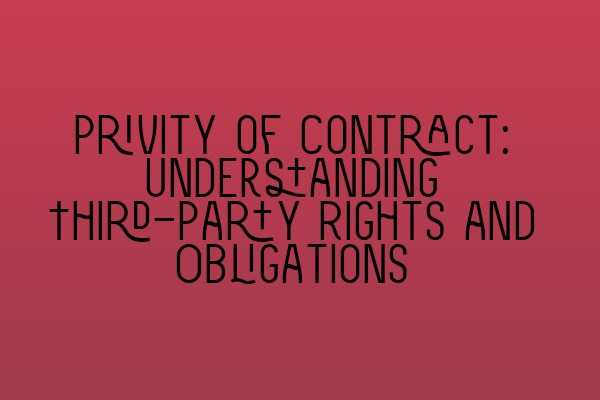Privity of Contract: Understanding Third-Party Rights and Obligations
In the world of contract law, one important concept that often arises is the privity of contract. The privity of contract refers to the legal relationship between the parties who have entered into a contract. It determines the rights and obligations that each party has towards each other. While this concept may seem straightforward, it becomes more complex when third parties are involved.
What exactly is privity of contract when it comes to third-party rights and obligations? Let’s dive in and explore this important aspect of contract law.
Privity of contract traditionally means that only the parties who are directly involved in a contract have the rights and obligations under that contract. This means that a third party who is not a party to the contract generally has no standing to enforce its terms or claim any benefits from it. For example, if A and B enter into a contract, C (a third party) cannot sue A or B for any breach of contract.
However, there are certain situations where third parties can have rights or obligations under a contract. These situations are known as exceptions to the privity rule. Let’s discuss some of these exceptions.
1. Intended Third-Party Beneficiaries:
In some cases, a contract may expressly state that it is intended to confer a benefit on a third party. This means that the third party has the right to enforce the contract. For example, if A enters into a contract with B to provide services, and it is agreed that the services are for the benefit of C, then C can sue A for any breach of contract.
2. Assignment and Novation:
Assigning or novating a contract involves transferring the rights and obligations of one or more parties to another party. This means that the third party who receives the assignment or novation can step into the shoes of the original party and enforce the contract. However, it is important to note that not all contracts are assignable or capable of novation, so it is crucial to check the terms of the contract.
3. Agency:
When an agent enters into a contract on behalf of a principal, the principal is generally the party to the contract. However, in certain circumstances, the third party with whom the agent interacts may have rights or obligations under the contract. This usually occurs when the third party is aware that the agent is acting on behalf of a principal and agrees to have a contractual relationship with the principal.
It is essential to keep in mind that each jurisdiction may have its own specific rules regarding privity of contract and third-party rights. Therefore, it is crucial to consult with a legal professional who is well-versed in contract law within the applicable jurisdiction.
Understanding the privity of contract and third-party rights is essential for both contracting parties and third parties. For contracting parties, it is crucial to consider whether they want to allow third parties to have rights or obligations under the contract. Furthermore, it is important to ensure that any agreements with third parties are properly documented to avoid confusion and potential disputes.
For third parties, it is important to be aware of the circumstances in which they may have rights or obligations under a contract. It is advisable for third parties to seek legal advice to understand their rights and ensure they are adequately protected.
In conclusion, privity of contract determines the rights and obligations between the parties who directly enter into a contract. While the general rule is that only these parties have rights and obligations, there are exceptions to this rule. Understanding these exceptions, such as intended third-party beneficiaries, assignment and novation, and agency, is crucial when dealing with contracts involving third parties. Remember to consult with a legal professional to navigate the complexities of privity of contract and third-party rights.
Related Articles:
– SQE 1 Practice Exam Questions
– SQE 1 Practice Mocks FLK1 FLK2
– SQE 2 Preparation Courses
– SQE 1 Preparation Courses
– SRA SQE Exam Dates
